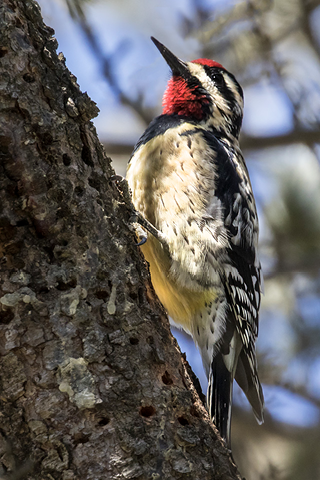Martha Steele

Yellow-bellied Sapsucker. Photo by Sandy Selesky
It is mid-afternoon on September 19, 2021, and Alvin and I are lying half asleep on a lawn chair in our Vermont yard. The sun warms our face and bodies as we listen to occasional insect buzzing sounds and squirrels chattering and breaking small branches as they scamper among the trees in the forest. Chip notes from Yellow-rumped Warblers and Yellow-bellied Sapsuckers drift to my ears. We are otherwise awash in silence and stillness save for our quiet breathing.
The days are getting shorter and the sun lower as we approach the autumnal equinox. The lush green of the summer is starting to give way to the brilliant reds, yellows, and oranges of the northern forest’s fall foliage. Migrants, largely silent, are passing through on their way to their wintering grounds. We listen and look for our resident Ruby-throated Hummingbirds to record the last day we note their appearance before they, too, are gone.
We are in another period of transition between seasons and between the birds we see and hear. But there is so much more to these annual transitions. Lying in the lawn chair on that brilliant late summer afternoon, everything felt different. The stillness, the silence, the crisp air, the disappearance of biting insects, the angle of the sun, the now empty vegetable garden, the crunching underfoot of leaves already fallen, the fading bee balm and other flowers, and the absence of frenetic bird activity. The transition in time also signals another birding season gone by, a reminder of our peregrinations of the spring and summer; what birds we saw and missed; or what we might do differently next year. Other more practical changes that were in full swing or imminent flooded my mind, such as changing out the screen door for the storm door, swapping out summer clothes for winter clothes, sweeping out the chimney for the upcoming kitchen stove fires, cutting out the dead canes from the raspberry patch in favor of new growth that will yield raspberries next year, putting the vegetable garden to bed for the winter, and switching from lawn mowers to snow shovels.
This year marked another major singular transition when I lost my mother in early March 2021. Bob, Alvin, and I have remained at her Vermont house, now ours, for nearly the entire time since then, taking full advantage of the spring and summer birding and continuing my parents’ vegetable and perennial gardens. Having spent nearly all of the pandemic in Vermont, I have grown to appreciate all the changing days and weeks of the northern year: walking on a narrow path across the snow to fill the bird feeders in winter; celebrating the first spring arrivals of migrants; earnestly planting vegetable seeds in early May; rising in the dawn hours throughout May and June to see what birds we could find; weeding and squashing insect pests in the summer; harvesting, sharing, cooking, canning, or freezing the bounty of the gardens; saying goodbye and good luck to our migrants heading south in the fall; collecting balsam to make wreaths for friends and family; setting up the bird feeders for another winter; and celebrating the year’s final holidays.
Many transitions, be they familiar and regular or born out of singular events such as a death, birth, marriage, or unexpected change come with visceral emotions. As I lay there with Alvin in the warm sun, I felt both relaxed and anxious, content and restless, satisfied and worried, and mindful and churning. I realized that the palpable change in the air also reminded me of the loss of my mother and how the coming seasonal transitions would carry the undercurrent of undesirable firsts: the first time we would not celebrate my mother’s October birthday with her; the first Thanksgiving in decades without her; and the first Christmas without her presence somewhere. At least with our migratory birds, I know I will hear them again and welcome them back the following spring to the northern forest, fields, and waters. But with the end of 2021 now approaching, the presence of my mother’s now permanent absence sinks deeper into my core and is, I think, part of why I feel such mixed emotions. Some transitions, then, reflect life’s regular ebb and flow, such as the seasonal changes in bird populations, and some transitions come with a finality that is not always welcomed.
When the sun dipped below the tree line along the edges of our yard thereby chilling the air, I got up with Alvin, folded the lawn chair to put it away, and went back into the house. I felt sad for my loss and all the losses that we all endure throughout our lives. I love the New England autumn but this year, I was already missing my mother and my avian friends whom I would not hear again for another six months or more. The sadness just showed up, as it often does, and I let myself feel it before moving on, as I know I will, to the next moment and the next transition that awaits me.
Martha Steele, a former editor of Bird Observer, has been progressively losing vision due to retinitis pigmentosa and is legally blind. Thanks to a cochlear implant, she is now learning to identify birds from their songs and calls. Martha lives with her husband Bob Stymeist, in Arlington. Martha can be reached at marthajs@verizon.net.